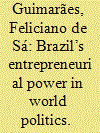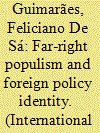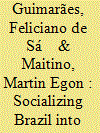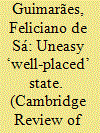|
|
|
Sort Order |
|
|
|
Items / Page
|
|
|
|
|
|
|
| Srl | Item |
| 1 |
ID:
163125


|
|
|
|
|
| Summary/Abstract |
In this paper, we apply the concept of entrepreneurial powers to analyze Brazil’s participation and influence in international crises. Following Ravenhill (this journal issue), we consider three dimensions of entrepreneurship: (a) the intention to convince others according to an actor’s interests; (b) the use of skilful politicians and bureaucracies to persuade partners; and (c) a proactive foreign policy that “sells” its position regarding the issues at stake. We argue that two other factors should be considered for a more encompassing view of entrepreneurial powers. First, the position of the involved great power on the crisis or in its negotiation. Second, that regional politics matter to entrepreneurial powers. We develop our argument using two case studies of success and failure respectively: the 1995 Cenepa War between Peru and Ecuador mediated by Brazil, and the 2010 Iranian nuclear deal sponsored by Brazil and Turkey.
|
|
|
|
|
|
|
|
|
|
|
|
|
|
|
|
| 2 |
ID:
171782


|
|
|
|
|
| Summary/Abstract |
In this paper, we analyze citizens’ attitudes toward regional leadership, employing two sets of survey experiments. Using Brazil as a case study, we analyze the first set of experiments with two types of regional leadership—structural and institutional—across three different regional issues—economic integration, regime change, and regional conflict. We found that Brazilians do not support either type of leadership, whether in regional conflict or in regime change issues, but support institutional leadership in economic integration scenarios. In the second set, we included specific South American countries both in regional conflict and in regime change scenarios. We found that Brazilians prefer Brazil to stay away from acting as a leader once neighboring countries are named in the experiment. Our findings indicate that the literature on regional leadership should incorporate the level of domestic support to understand its implications to the exercise of regional leadership. We embedded our experiments within the project “The Americas and the World: Public Opinion and International Politics, 2014–2015.” We used a nationally representative sample of eighteen hundred respondents undertaken in 2014.
|
|
|
|
|
|
|
|
|
|
|
|
|
|
|
|
| 3 |
ID:
180829


|
|
|
|
|
| Summary/Abstract |
In the last two decades, far-right populists have formed governments all over the world. However, systematic analyses on how far-right leaders recreate their countries' foreign policy identity are still underdeveloped. In this article, we analyse how far-right populist leaders use their conservative identity-set to align with other right-wing governments and how they use the same conservative repertoire to deal with ideological rivals. More precisely, we argue that these leaders tend to overemphasize a deep conservative identity-set towards other far-right populist governments, something we call ‘thick conservative identity’. This profoundly conservative identity-set is composed of three national role conceptions: anti-globalism, nationalism and anti-foe. However, they do not repeat this identity-set towards ideological rivals, preferring to use a more nuanced and contradictory one, something we call ‘thin conservative identity’. The trigger of such difference is the anticipated mutual expectation of conservatism between Ego and Alter, in which Ego mimics Alter's deep conservatism. We use Jair Bolsonaro's alignment with Donald Trump and Bolsonaro's relationship with China as illustrative cases. We use the main concepts of role theory to understand both how conservative alignments are created and how far-right governments deal with ideological rivals.
|
|
|
|
|
|
|
|
|
|
|
|
|
|
|
|
| 4 |
ID:
164661


|
|
|
|
|
| Summary/Abstract |
In this article we show that small powers are able to socialize regional leaders using altercasting strategies. The altercasting operates within the leader's role repertoire replacing the master role—natural leader—with a previously inactive role—regional paymaster. This process is only possible because altercasting empowers domestic oppositions and recalcitrant secondary powers against the leader's initial master role, which is perceived as inadequate or unfair, unbalancing the leader's decision-making process towards an entire master role remaking. Since the regional community is a projection of the regional leader's values and interests, altercasting represents an effective bottom-up strategy available for small powers to socialize regional leaders and change their local community. We propose a theory refinement on master role transitions based on a mechanism that incorporates altercasting, domestic, and regional contestation concepts. We develop our argument using a case study—the 2006 Bolivian gas crisis.
|
|
|
|
|
|
|
|
|
|
|
|
|
|
|
|
| 5 |
ID:
177613


|
|
|
|
|
| Summary/Abstract |
In this paper, we argue that the Brazilian diplomatic discourse portraits an uneasy sense of ‘well-placement’ within both Latin America and the West. On the one hand, Brazil’s diplomatic narrative indicates an aspiration to belong to the West, yet without denying Brazil’s credentials as a developing or Third World country. On the other hand, Brazilian diplomats perceive Brazil as a Latin American country without denying its unique inheritance of Portuguese colonialism, a notion that somewhat dismisses Brazil’s linkages with Latin America’s main cultural traits. We show that this uneasy sense of ‘well-placement’ can be observed in Brazil’s complex identity-set, which is composed of three overlapping and contradictory layers of identity. The first layer is comprised of profound and firmly embedded identities created by regional and historical references, such as the Portuguese-Brazilian identity and Americanism. A second, less entrenched layer involves identities related to the foreign policy concept of autonomy created in the 1950s and 1960s. The third layer includes contemporary role conceptualizations, such as ‘emerging power’ and ‘regional leader.’ This complex identity-set shows Brazil’s contradictions concerning its place in the world, but arguably not the profound cognitive dissonance within its region and cultural affinities that tends to characterize Misplaced States.
|
|
|
|
|
|
|
|
|
|
|
|
|
|
|
|
|
|
|
|
|